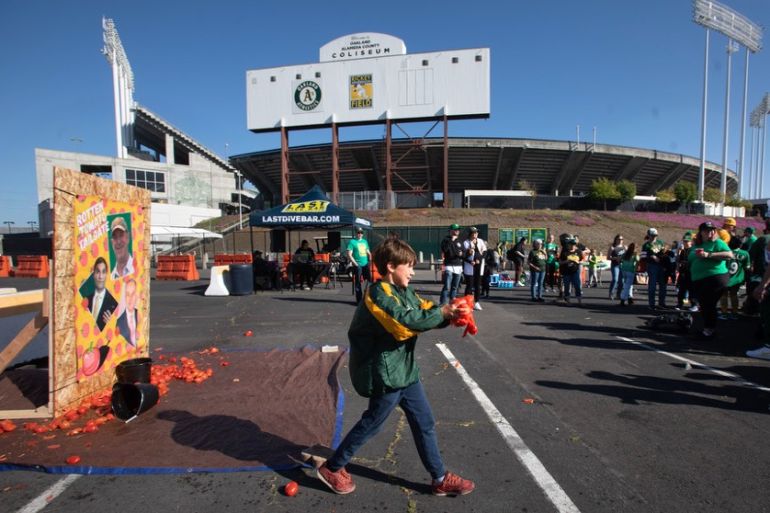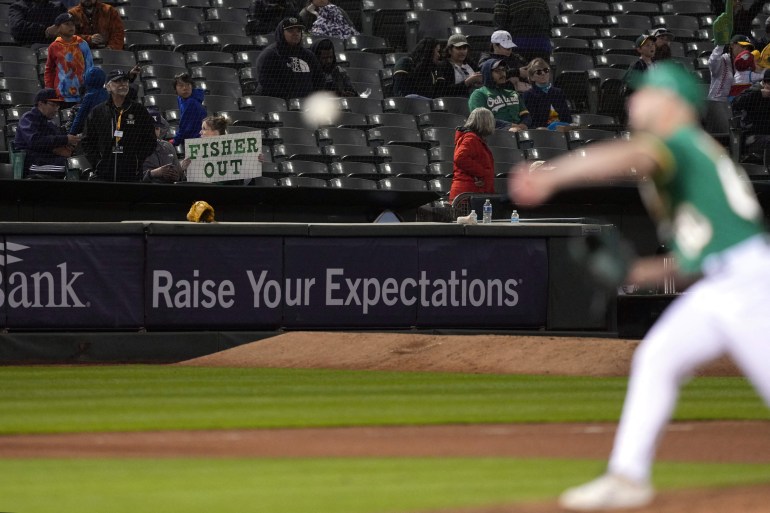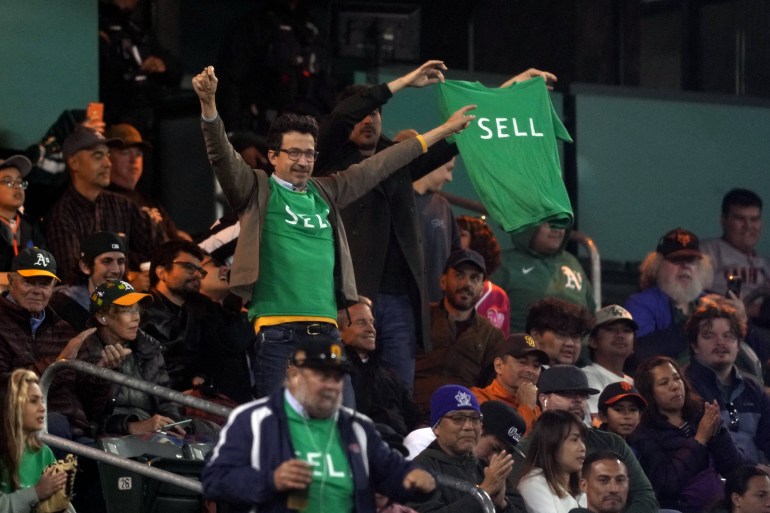‘Incalculable loss’: Oakland battles to save last pro sports team
As Major League Baseball’s Oakland Athletics look set to move to Las Vegas, fans say the loss goes far beyond sport.

Oakland, United States – When the hall-of-fame sportswriter Frank Deford took a trip to Oakland, California in 1968 he did not seem to hold the hardscrabble city in high regard, but allowed that it at least had sport going for it.
The Raiders of the NFL, the NBA’s Golden State Warriors, and Oakland Athletics of Major League Baseball had all recently become based in the city.
Keep reading
list of 4 itemsNFL great and civil rights activist Jim Brown dies aged 87
Spain arrests four after effigy of Real Madrid’s Vinicius hung
FIFA’s ban on Zimbabwe sparks domestic football revival
“The franchises swell Oakland with self-esteem and, prancing in its fresh swagger, the city sees itself in a brighter light,” Deford wrote.
The A’s, Warriors, and Raiders won Oakland—a city of some 400,000 residents—four World Series crowns, four NBA championships, and two Super Bowls. Figures such as the glowering and imperial Raiders’ owner Al Davis, Billy Beane of the Moneyball A’s, and the shimmying and balletic NBA great Steph Curry earned Oakland teams a celebrity status beyond the US.
But in recent years the city’s sports teams have faced loss after loss. In 2019, the Warriors moved to a new arena across the bay in San Francisco, and the following year the Raiders left Oakland for Las Vegas.
Now, John Fisher, the Athletics’ billionaire majority owner, is attempting to follow in the Raiders’ footsteps.
On May 15, media in Nevada reported that Fisher had reached an agreement with Bally’s Corp, a gaming company, to build a baseball stadium at the site of the Tropicana Hotel in Las Vegas. Fisher and his chief lieutenant, team president Dave Kaval, are working to pass a funding package through the state legislature before the end of its session in June.
Pending a favourable vote from legislators, along with approval from Major League Baseball’s 29 other owners, the Oakland A’s could be the Las Vegas A’s as early as 2025.
Owners relocating their sports clubs is not exactly unheard of in the US – the Athletics, after all, came to Oakland in 1968 from Kansas City – and relocation is always painful for the fans.
But Oakland would become the only major sports town in the US to have lost all of its teams and Athletics fans say the loss goes far beyond sport.
“It’s devastating,” April Kenton, an Oakland native and third-generation season-ticket holder, told Al Jazeera. “We are all heartbroken.”
Oakland’s crumbling Coliseum
Some rich people buy professional sport teams for prestige, others out of genuine interest and fandom.
Many, however, buy pro teams because they have proven to be airtight investment assets. Today, all 30 MLB franchises are worth more than $1bn. In 2009, only two were.
Many team owners have been able to use their teams as vehicles to obtain what has been dubbed “corporate welfare” – public funding, tax breaks or other assistance – and turning it into public profit, particularly through new stadiums. Last year, lawmakers in New York state reached a deal with the Buffalo Bills to use $850m in public funds to help the NFL side’s billionaire owners build a new stadium.
“Anytime a team gets a new stadium, you immediately see its valuation rise,” said Victor Matheson, an economics professor at College of the Holy Cross.
After Fisher bought a majority stake in the Athletics in 2016, he almost immediately began lobbying politicians in Oakland to provide him hundreds of millions of dollars in public funding to help him build a new stadium closer to Oakland’s downtown.
While a fanbase tired of struggling in a decades-old stadium largely supported the move within Oakland, Fisher has never been a fan favourite.
As an heir to the Gap Inc fortune, the 61-year-old is worth more than $2bn, but fans have said he has never invested adequately in the club. Some fans have accused him of spending years degrading the team, so he could weaponise declining interest in it as justification for moving.
He has also allowed the team’s facilities to deteriorate and the increasingly crumbling Oakland Coliseum, where the A’s still play, has been given over to possums and a small community of feral cats.
He now spends less on the A’s entire roster than some teams do on just one player, and some fans say his failure to invest in players has made the team into a competitive laughing stock. So far this season, the A’s rank among the worst teams ever assembled in the history of the sport.
To add insult to injury, he doubled season ticket prices at the onset of the 2022 season.
Fisher blamed his frugality on the fact that he did not have a new stadium and said the Oakland Coliseum is outdated, set in an industrial part of town, and difficult to wring revenues out of.
“This is why we need a new stadium,” Kaval told the San Francisco Chronicle, in 2022. “In order for us to retain our talent, to have a much higher payroll, we need higher revenues. That comes with a new fan-friendly facility.”

Fisher had promised to build the stadium itself with private funding and shaped the A’s marketing strategy around what their presence in Oakland represented to the city. But the project was not viable without many seismic infrastructural improvements to the area around the stadium, which the A’s were asking the city to fund, to the tune of at least $500m.
Negotiations between Fisher and the Oakland city council over terms for a development deal began late in 2018. In 2021, those negotiations stalled as Oakland had only managed to rustle up a portion of the subsidies Fisher was demanding.
In response, Fisher enlisted MLB commissioner Rob Manfred to announce that the A’s would begin “exploring other markets,” as Fisher continued negotiating with Oakland.
Then, last month, it was reported that Fisher had entered into a “binding” agreement – effectively behind the city of Oakland’s back – to buy and develop land on the Las Vegas strip.
Kaval said it was “disappointing” that the move within Oakland was not going to happen, but that it fell through over investment and timing and that was why they went ahead with the land purchase in Las Vegas.
“We’ve been working almost 20 years as an organisation to find a permanent home for the A’s,” Kaval told NBC News Bay Area. “We really are at the point where we needed to find a path that we could achieve success on that timeline.”
Oakland’s Mayor Sheng Thao apparently had no knowledge the A’s were pursuing a land agreement in Las Vegas and believed negotiations were in progress.
“Oakland is not interested in being used as leverage in the A’s negotiations with Las Vegas and it is disrespectful to our residents and our fans to string the city along this way,” she told reporters.
Meanwhile, fans say they have been ignored by Fisher and Kaval since the Vegas news broke.
“Fisher’s disregard for A’s fans is appalling,” Alex Espinoza, a lifelong A’s fan, podcast host, and writer for local radio station 95.7 The Game, told Al Jazeera.
“He is so bad at his job, so incompetent and fails to take any accountability. [Watching him move the A’s] is like being powerless as your house gets robbed by the Hamburglar.”
‘Ruined the love of the game’
Most fans have since stopped showing up to the games in revolt. Others are protesting on the bleachers with banners reading, “Fisher is scum,” “Kaval = Liar,” and “Fisher out!”. Calls for Fisher to “SELL THE TEAM!” echo around the park.
On May 12, the “Last Dive Bar” fan group held a rally in the Coliseum parking lot in which fans were invited to huck tomatoes at photos of Fisher and Kaval.
“Fisher and Kaval have ruined the love of the game of baseball for many fans here,” said Casey Pratt, a reporter with AB7 News Bay Area who has been covering this story for years.
Jorge Leon, a lifelong A’s fan and the president of the Oakland 68s, a supporters’ group, told Al Jazeera the “decline of a once-proud franchise at the hand of a trust fund kid” had left him sad, angry and disgusted.
“I hate that in the USA, relocation is seen as ‘business as usual’,” Leon said.

When a city like Oakland loses pro sports, it loses more than a piece of its history. It loses a part of its identity, its role as a community asset, and an aspect of its future.
“There is just not another easy outing that is available on that many spring and summer weekend days that can replace A’s games with my son,” says Jeremy Owens. “The loss would be incalculable.”
While many think it is likely the A’s will end up leaving Oakland, some fans hope they can still prevent the loss.
While Fisher is seeking at least $395m to fund his stadium construction project in Las Vegas, reports have suggested legislators are currently “only willing to contribute up to $195m”.
If Fisher and Nevada cannot reach a deal by the end of the state’s legislative session, he may be forced to either come back to Oakland or sell the team.
If the A’s were to leave, the possibility of establishing a semi-pro independent ball club has been raised – although it would hardly compensate the fans left behind.
“They say there is no crying in baseball,” Karly Kaufman, an A’s fan based out of the neighbouring city of Alameda, told Al Jazeera. “I’m not ashamed to admit that I’ve cried.”